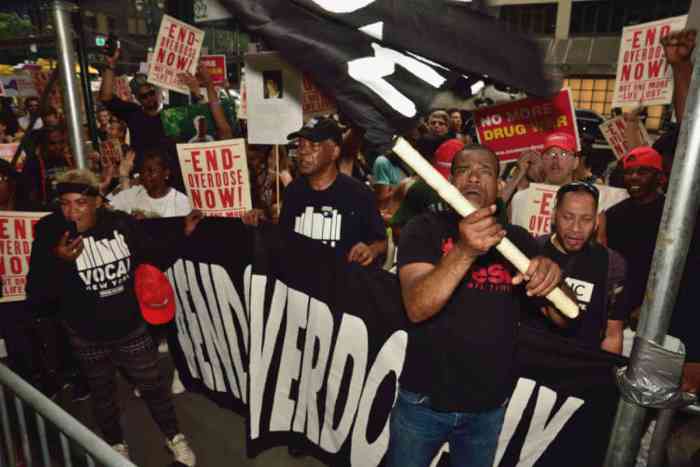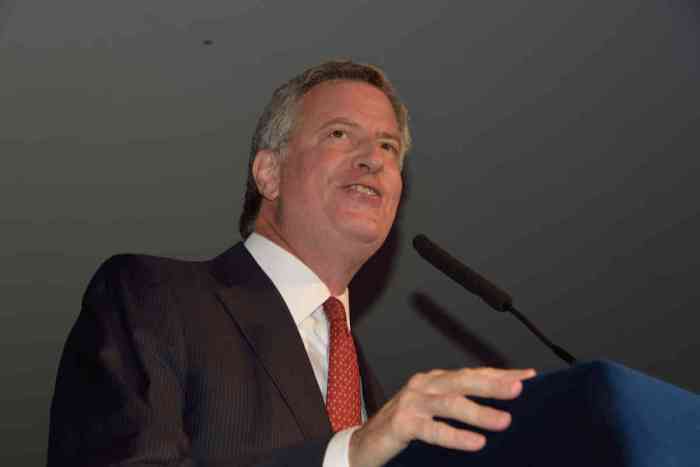Queens State Assemblymember Andrew Hevesi was harshly critical of Governor Andrew Cuomo, unwilling to endorse the views of some activists that it was the Senate Republicans who posed the problem. | GAY CITY NEWS
With the New York State legislative session ending without an agreement on how to spend billions that Governor Andrew Cuomo proposed be used to fight homelessness, advocates and their allies are pummeling the governor for breaking a promise.
“The governor is on the hook for promising 20,000 units of supportive housing, but then come budget time, he only funded 6,000, and now he comes back and funds 1,200,” said Assemblymember Andrew Hevesi, a Democrat who represents part of Queens, at a June 21 protest outside of Cuomo’s Manhattan office.
In January, Cuomo proposed spending $20 billion over the next five years to build affordable housing, emergency shelter beds, and supportive housing, which combines housing with social services. When the state budget was passed for the fiscal year that began on April 1, only 6,000 supportive housing units were funded. The budget said that Cuomo would negotiate a memorandum of understanding (MOU) with the State Senate and Assembly that would control how the $1.9 billion in the budget for housing would be spent. On June 17, the session’s end, advocates learned that just $570 million would be spent on housing in the current fiscal year and just $150 million of that was new money.
AIDS groups join others in criticizing how $20 billion over five years became just $570 million in fiscal ‘17
AIDS groups were interested in the MOU because of its implications for the Plan to End AIDS, which aims to reduce new HIV infections from the current roughly 3,000 a year to 750 annually by 2020. The plan, which is currently being implemented, uses anti-HIV drugs in HIV-negative people to keep them uninfected and treats HIV-positive people so they are no longer infectious. Some science supports the view that stable housing, nutrition, and other services make it easier for HIV-positive people to remain adherent to their medication regimen.
AIDS group want to enact HASA For All, which is pending in the City Council, that will allow the city’s HIV/ AIDS Services Administration (HASA) to serve people who are HIV-positive, but have not progressed to AIDS, in addition to those with an AIDS diagnosis, who are already served. HASA supplies rental assistance, food stamps, Medicaid, and other services. As more people with HIV take anti-HIV drugs, that later stage of HIV infection is increasingly rare. An estimated 6,000 HIV-positive people in the city would be financially eligible for HASA, but are currently denied services because they do not have AIDS.
Mayor Bill de Blasio is committed to enacting HASA For All, but only if the state funds a portion of the cost.
Housing Works, which participated in the June 21 protest, believed that a deal was in the MOU to fund costs related to HASA For All, but it was stopped by the State Senate, which is controlled by the Republicans.
“There was an agreement between the governor and the Assembly including HASA for All… and there was an agreement with the city,” said Ginny Shubert, a principal at Shubert Botein Policy Associates, a consulting firm. “The Senate killed it… The sad thing is we were there, we had it, which is not insignificant, the governor and the mayor on the same page.”
Shubert is allied with Housing Works, a leading AIDS services organization. Hevesi, who participated in the MOU negotiations, said that the Senate is not to blame because there was nothing to kill.
Dozens of protesters turned up outside Governor Andrew Cuomo’s Midtown office on June 21 to protest what they termed a broken promise on new housing initiatives to combat homelessness. | GAY CITY NEWS
“We were nowhere near an agreement on HASA,” he said at the protest, which was organized by the Campaign 4 NY/ NY Housing, a coalition of more than 300 housing groups from across the state. The protest drew several dozen people, who spent an hour chanting and giving speeches outside Cuomo’s office.
Charles King, the chief executive at Housing Works, is credited with developing the Plan to End AIDS, along with Mark Harrington, the head of the Treatment Action Group, a policy organization. King, who is known for his aggressive advocacy, has largely avoided criticizing Cuomo, whom he has to rely on for money and to implement policies. While King was not at the protest, Housing Works was not silent.
Andrew Coamey, the senior vice president who oversees construction, facilities, and housing at the agency, spoke and called on Cuomo to “show some honesty, show some integrity,” and “keep your promises.” VOCAL-NY, another AIDS housing group, also joined the protest.
In late 2015, anonymous staffers in the Cuomo administration were cited in a news article saying the governor would propose spending $200 million on the Plan to End AIDS in the current fiscal year. In 2014, King said that $104 million for the plan would be a “dream number.” But when the budget was introduced, it turned out the promise was for $40 million a year over five years and even that amount is not in the budget for the current fiscal year.
“The other thing that is just as egregious to me is the promise last year on World AIDS Day, the $200 million,” Hevesi said. “He came up with $10 million this year, that’s it.”
Cuomo has developed a long track record of making bold promises that he does not keep and, like many politicians, of making bold pronouncements that are less than accurate, but his willingness to attack critics, as he has attacked de Blasio, has generally meant that he has few people criticizing him.
The possibility that negotiations could reopen are distant because the urgency that comes with the legislative session ending is gone, Hevesi said.
“It’s absolutely possible, but in reality, it’s highly unlikely,” he said. “The impetus or a catalyst to push the negotiations forward has now stopped… They’re not going to do it later, it’s an election year. People are focused on their own election, they’re focused on their own district, or quite frankly they’re going on summer vacation… I have no indication that they’re going to reopen the MOU negotiations any time soon.”
The Cuomo administration did not respond to a request for comment.




































